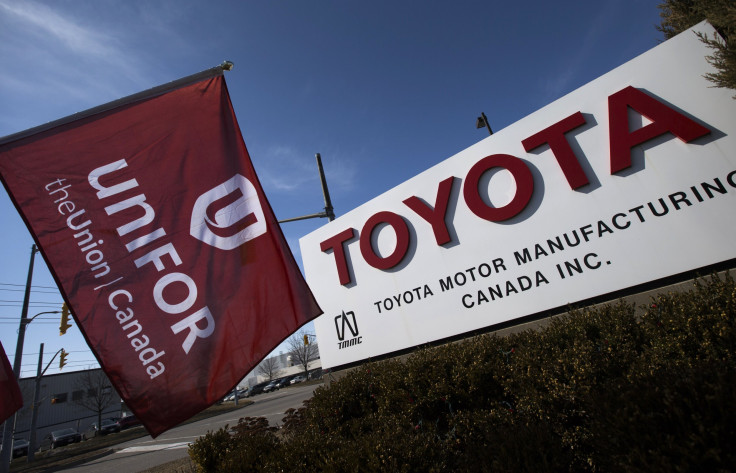Toyota Pushes Back Against Union Bid To Organize Ontario Factories; Union For Canada (Unifor) Says It’s Moving Forward Carefully

The stakes are rising in the latest skirmish over a union trying to win support for the first-ever representation of a foreign automaker’s plant in the U.S. or Canada. Just a few months after the UAW lost a high-profile bid to unionize VW workers in Tennessee, a Canadian union is battling Toyota amid industry concerns that the company’s defeat could reinvigorate union efforts at U.S. facilities.
The conflict heated up earlier this month after Toyota Motor Corp. (TYO:7203) challenged union organizers' estimate of employee numbers and the validity of union cars held by current workers.
“I see it as caution,” Kristin Dziczek, director of industry and labor groups at the Center for Automotive Research in Ann Arbor, Mich., told IBTimes by email on Tuesday. “Automaker-organizing drives are high profile events, and they need to be fully confident they have the support to move forward. Unifor can’t risk an embarrassment.”
The drive affects Toyota’s three Canadian factories located in the cities of Cambridge and Woodstock that manufacture the RAV4 crossover and its electric counterpart, the Corolla sedan, the Matrix hatchback and the Lexus RX 350 luxury compact crossover. A plant owned by Mitsubishi Motor Manufacturing of America Inc., is the only foreign-owned auto factory in the U.S. or Canada that has union representation thanks to a past joint-venture with Chrysler that ended in 1991.
Toyota “disagrees with [Unifor’s] estimate of the number of individuals in the bargaining unit included in the application for certification and says there are 7,555 individuals in that bargaining unit,” the company said in a 54-page rebuttal to Unifor’s drive submitted to the Ontario Labor Relations Board. Toyota Motor Manufacturing Canada (TMMC), the wholly owned subsidiary of the world’s largest auto manufacturer by sales volume, also challenged the status of 399 student-workers at its three Canadian factories. The company says student-workers and temporary contract employees should be included in the vote.
Ontario law mandates that at least 40 percent of a workplace’s employees must have signed union cards before they can call a vote for union representation of a plant. Unifor estimated that TMMC had 6,590 workers and that it had acquired "more than 3,000" signatures. However, TMMC is also challenging the validity of many of these cards.
Unifor emerged last year when the Canadian Auto Workers (CAW) and unions affiliated with energy, communications and paperwork combined to form a 300,000-strong negotiating group. But TMMC says Unifor cannot simply accept CAW cards in this vote since Unifor is a new negotiating group formed in 2013.
“CAW membership is not Unifor membership,” TMMC maintains in its rebuttal. It also wants to invalidate all cards signed beyond six months in the past on the basis that they do not constitute “current intention” of an employee to join a union. The company also questions the way the cards are collected and verified, claiming they are “non-witnessed” and “non-verifiable.”
The Canadian fight follows a February vote in which the United Auto Workers in the U.S. failed to unionize a Volkswagen Group plant in Chattanooga, Tenn. A win north of the border could reinvigorate union efforts at the six U.S.-based facilities owned by the Japanese auto giant, says Dziczek.
In February, the UAW lost a vote to unionize Volkswagen’s sole factory in the U.S., located in Chattanooga, Tenn., where the Passat sedan is manufactured. Union activists criticized the heavy anti-union lobbying by outside groups and controversial remarks made by Sen. Bob Corker, R-Tenn., where just days before the vote he claimed -- but never later substantiated -- that Volkswagen officials promised a new vehicle contract if workers votes against the unionization.
Volkswagen, like Toyota, has union representation at most of its factories outside of the U.S.
© Copyright IBTimes 2024. All rights reserved.





















